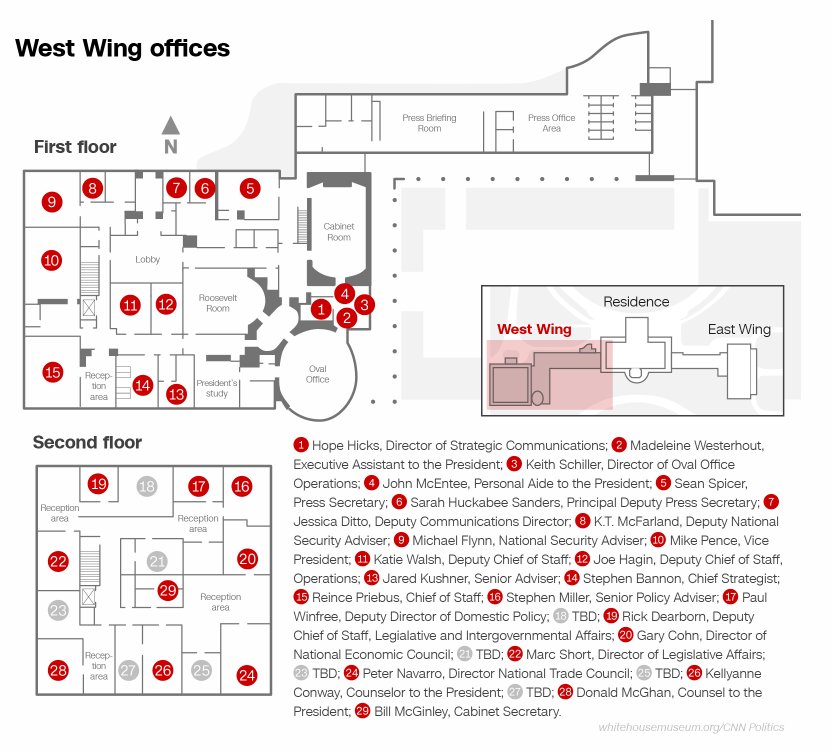Michael Flynn (office 9 in the above pic) resigned under pressure yesterday. The supposed reason being given is that he repeatedly lied to VP Pence about not having discussed sanctions with the Russians last year. Who knows if this is true? Firing Flynn makes Trump look doubly weak, first for having trusted him in the first place, and second for appearing to give into outside pressure days after saying all was hunky-dory. For a “The buck stops everywhere but here” guy like Trump, he’s going to need a scapegoat for forcing him to make Flynn a scapegoat.
And Trump definitely backed down. When the CIA rejected a security clearance for Flynn’s aid Robin Townley on Friday, it was tantamount to a declaration of war by the CIA on Flynn. Honestly, Flynn and Trump had already declared war on the CIA by denigrating it publicly, accusing ex-director John Brennan of leaking fake news, and generally being an idiot. It affirms what I said last time: if the far smarter Lenin was vexed and foiled by the primitive Russian bureaucracy he inherited after the Russian Revolution, what chance do Trump and Bannon stand against the far larger and more sophisticated American bureaucracy in their supposed revolution?
Here’s where this stops being a purported diary, because there’s a specific reason that makes me quite relieved that Flynn in particular is gone, but I can’t talk about it in public. So I have to break the illusion of writing just for myself and self-censor here. But this anecdote about Flynn speaking to the DIA in 2012 seems to encapsulate as well as any why I think it’s good he’s gone:
NYT: Mr. Flynn said that the first thing everyone needed to know was that he was always right. His staff would know they were right, he said, when their views melded to his. Some also described him as a Captain Queeg-like character, paranoid that his staff members were undercutting him and credulous of conspiracy theories.
The larger question is how it relates to Russia and Trump’s bizarre inability to say anything bad about Putin. (Update: oops, he just told Putin to return the Crimea. That was a quick turnaround.) I think that’s a question for another day. There’s clearly a lot going on behind the scenes.
What happens next is hard to predict. The administration is already in permanent crisis mode, lines of communication are breaking down, and no one is in charge. As I’ve said before, it more closely resembles a junta at the end of its regime rather than at the beginning. At the center of it is the defective Donald Trump, walking around the White House like a zombie in the evenings, subsisting exclusively on a diet of cable news. And that’s the oddest thing about this spectacle, which is that the spectacle and its spectators are often indistinguishable. Take this:
Were there leaks from inside the NSC? Of course there were. “But the notion that these are political is wrong. These are patriots,” argued a former Obama administration official in comments to The Daily Beast. “They are all staff, from CIA, the State Department and Defense Department. They are…the all-star team from their respective agencies.”
“The reason why they are leaking is because they are cut out of the process and the process is dysfunctional,” the official said of conversations he had with such staffers still working at the NSC. “They are horrified. The general sense that the only way to impact policy is to get it on a morning show.”
So much of this is playing out in public because of Trump himself. Because he reacts to appearances, and cares only about his own appearance rather than accomplishing anything in itself, an issue truly does not register with him until it is public. And once it is public, he can’t let it go, whether it’s his 3 million popular vote loss or the size of the crowds at his inauguration. The news media, in turn, mindlessly feed this bottomless hunger by magnifying whatever the object of Trump’s angst is so that he sees it even more. It’s a codependent feedback loop, and it would be pretty funny if it weren’t such a gift to everyone Trump isn’t paying attention to.
But it’s also a comment on the strange medium that is news today. I’m not just talking about CNN here, but about the entire DC news media establishment. What we are effectively witnessing is not a war between the media and the Trump administration, but between the governmental establishment and Donald Trump himself, with the media being used as the vehicle for that conflict. (Some of the establishment is even in the White House: Chief of Staff Reince Priebus, VP Mike Pence, and Press Secretary Sean Spicer all have divided loyalties to say the least.)
Most of what constitutes political “news” in this day isn’t really related to investigation. Rather, it’s about connections and sources. There are reporters who come to be strongly identified with a particular set of sources. For example, during the Iraq War, there was Judith Miller on the side of the neocons and Walter Pincus on the side of the CIA veterans. David Farenthold’s much-hailed scoops on Trump’s finances last year were little more than actual reporting; the most remarkable thing about them was that a person such as him got into a position to get them printed by a major paper. I had a few significant scoops during my time as a journalist, and they were studiously ignored by the rest of the press, and others have told me the same thing. National journalism today is about access, not research.
Here are a couple striking recent examples of this sort of journalism:
NYT: Tony Thomas, head of the military’s Special Operations Command, expressed concern about upheaval inside the White House. “Our government continues to be in unbelievable turmoil. I hope they sort it out soon because we’re a nation at war,” he said at a military conference on Tuesday. Asked about his comments later, General Thomas said in a brief interview, “As a commander, I’m concerned our government be as stable as possible.”
NYT: Two people with direct access to the White House leadership said Mr. Flynn was surprised to learn that the State Department and Congress play a pivotal role in foreign arms sales and technology transfers. So it was a rude discovery that Mr. Trump could not simply order the Pentagon to send more weapons to Saudi Arabia — which is clamoring to have an Obama administration ban on the sale of cluster bombs and precision-guided weapons lifted — or to deliver bigger weapons packages to the United Arab Emirates.
Buzzfeed: “I was hoping you could tell me what the fuck is going on over there,” said one European Union intelligence official. “There’s no guide for handling this sort of situation, happening with such an important and powerful ally,” the official said. “If anything, it’s a wake up call to European leaders that counting on America isn’t currently a smart policy. Of course this is exactly what Putin wants — to destabilize the Atlantic alliance — but I have to counsel my policymakers the best I can and right now it’s, ‘Prepare to handle some crises without US support.’”
Politico: Trump often asks simple questions about policies, proposals and personnel. And, when discussions get bogged down in details, the president has been known to quickly change the subject — to “seem in control at all times,” one senior government official said — or direct questions about details to his chief strategist Steve Bannon, his son-in-law Jared Kushner or House Speaker Paul Ryan. Trump has privately expressed disbelief over the ability of judges, bureaucrats or lawmakers to delay — or even stop — him from filling positions and implementing policies.
Politico: If there is a single issue where the president feels his aides have let him down, it was the controversial executive order on immigration. The president has complained to at least one person about “how his people didn’t give him good advice” on rolling out the travel ban and that he should have waited to sign it instead of “rushing it like they wanted me to.” Trump has also wondered why he didn’t have a legal team in place to defend it from challenges.
WaPo: Former officials with deep knowledge of the presidency describe Donald Trump’s White House staff as top-heavy, with five or six power centers and little vertical structure. “The desire to be a big shot is overrunning any sense of team,” says one experienced Republican. “This will cause terrible dysfunction, distraction, disloyalty and leaks.”
WaPo: [Trump friend and Newsmax CEO] Christopher Ruddy went on to detail his critique of White House chief of staff Reince Priebus: “It’s my view that Reince is the problem. I think on paper Reince looked good as the chief of staff — and Donald trusted him — but it’s pretty clear the guy is in way over his head. He’s not knowledgeable of how federal agencies work, how the communications operations work. He botched this whole immigration rollout. This should’ve been a win for Donald, not two or three weeks of negative publicity.” [Ruddy later backed down.]
These are killer quotes, but they’re not really “news” in the traditional sense. All such accounts and quotes from anonymous or even non-anonymous sources are given with some agenda in mind. They may be true, but they’re certainly all spun. And most of the spin these days is in a distinctively anti-Trump direction, because Trump scares the living daylights out of them and is incapable of reassuring them. They’re also given with a specific audience in mind, and that audience is sometimes Trump himself.
To stop the flood of leaks and trash talk, all Trump would have to do is to give in and agree to do things their way (that is, the way they’ve been done since Eisenhower, loosely speaking), but because he believes he’s suffered injury at the hands of the CIA, the State Department, the news media, the Democrats, most Republicans, and more or less anyone who’s ever had to deal with him, he doesn’t want to give them the satisfaction. So he’s stuck with Bannon and Miller’s vague ideas of taking on the establishment, just so he can show them all. I have been quite critical of the intelligence establishment over the years, and yet I find it incoherent to think of siding with Trump against them because Trump doesn’t stand for anything except his own self-aggrandizement. He doesn’t even pretend to care about anything else. The man is a void.
So now Trump is stuck getting angry at the media for printing verbatim words of executive branch employees. This is classic authoritarian paranoia, and it quickly will make any government sclerotic. With Trump, though, it takes on an ironic dimension because it’s only through the media that anything gets through to him at all. He has no interest in anything other than the vision of himself reflected through the television screen, and all the TV says is how that vision is screwing up royally. That moves him to action, but unpredictably. I imagine it as being like Hamlet if all Claudius ever did was watch plays. Suddenly Hamlet’s ridiculously circuitous plan to ascertain Claudius’ guilt is now the only way to get through to him.
And yet there’s a hollowness to it all, because all these news accounts are not striving to ascertain the facts or determine the truth, but are themselves mere receptacles for the parroting of other people’s images of the world. Reporters don’t fact-check these statements, because it’s not their claim, it’s just what a source said. If they can get nine sources to say it, that’s not an insignificant detail, but at the end of the day the assurance provided by papers of record is only that their sources are who they say they are and that they really said the things they are saying. It’s not that what the sources said is true.
Next to Trump’s view of the world, almost anyone’s will appear more convincing, but at the end of the day we are only eavesdropping on telegrams delivered between two distant planets at war with one another, without ever being able to see the actual combat. The thing is, I suspect even a lot of people in DC feel this way as well. In the short time I spent in DC, it was the land of cocktail parties and dinners, where everything takes place in person and people communicate through backchannels. It is an island working with its own vision of the world–or more accurately, multiple competing visions of the world. It is the world of governance, but not of the governed. It’s perfectly fitting that DC itself has no Congressional representation.
But we just elected a president whose world vision is at odds with very nearly everyone in DC (very nearly everyone period), so now a lot of those internecine fights (about health care, for example) are taking a back seat to dealing with the sheer clash of competing realities. Maybe it’s not fair to call Trump’s vision a reality at all, since it’s so premised on the presentation given him through the news. He’s a man who would rather watch CNN than read classified briefings, so making informed policy requires him to pull himself up by his bootstraps. He wants to hear about how great he is before he does the thing that’s going to make him great. This may explain why he has already made two humiliating climbdowns on the travel ban and on Flynn: nothing (neither principle nor ambition) stops him from deciding that something was always a bad idea once it starts making him look bad. So despite the damage Trump is evidently capable of doing through negligence if nothing else, I don’t see how his “reality” wins. It literally has nothing to offer anyone but Donald Trump.
There are two types of people in the world today: people who Donald Trump doesn’t care about, and Donald Trump. DC is going to increasingly see itself in the first category.


